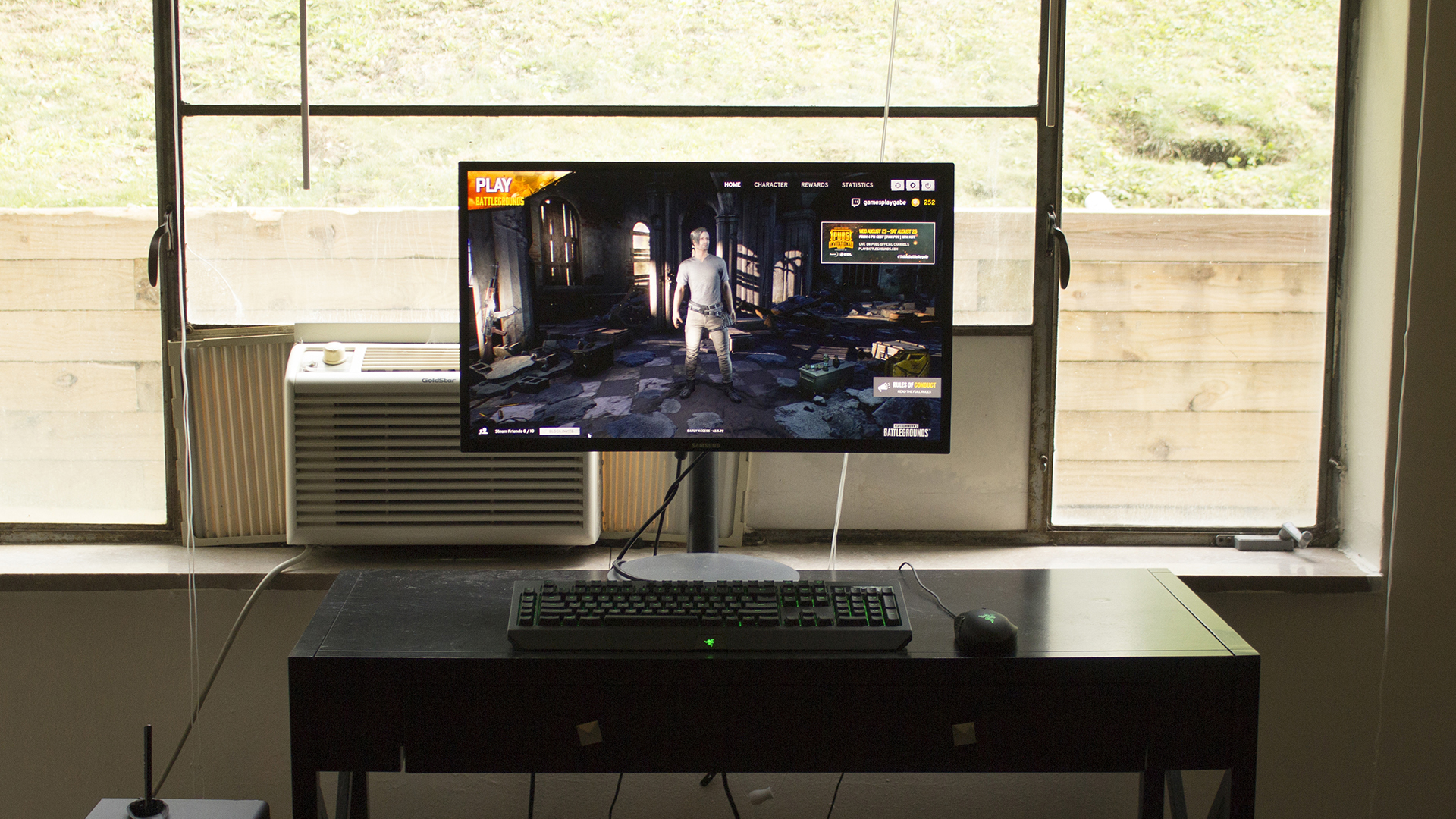TechRadar Verdict
The Samsung CFG70 Series 27-inch curved gaming monitor makes good on high frame rates and lower latency, but it ultimately falls flat with high pricing and the omission of ubiquitous features.
Pros
- +
High refresh rate coupled by low latency
- +
Excellent color contrast
- +
Flexible dual-hinge arm
Cons
- -
Expensive for 1080p
- -
Lacks latest ports
- -
Base takes up too much space
Why you can trust TechRadar
While most 27-inch gaming monitors are focused on increasing pixel density or stretching the aspect ratio, Samsung has thought differently with its Samsung CFG70 Series 27-inch curved gaming monitor.
By skipping out on an Ultra HD resolution and sticking with the good ol’ 16:9 approach, the company has been able to masterfully craft a 144Hz monitor with a fully articulating dual-hinge while squeezing in its signature quantum dot technology for markedly more vivid colors and deeper blacks.
Opting for a higher refresh rate over more pixels means that gamers can anticipate faster response times – therefore lower latency – and more frames per second in competitive multiplayer games like Overwatch and Counter-Strike: Global Offensive (CS:GO). However, it also means that fans of predominately single-player and indie experiences should consider other affordable options.
Whatever the case may be, you have to know what you’re signing up for first. Because while Samsung’s 27-inch CFG70 is well-built and shrewdly designed, it isn’t likely to bear much appeal beyond a specific niche, a qualm we’ll discuss further later on. But first, the price.
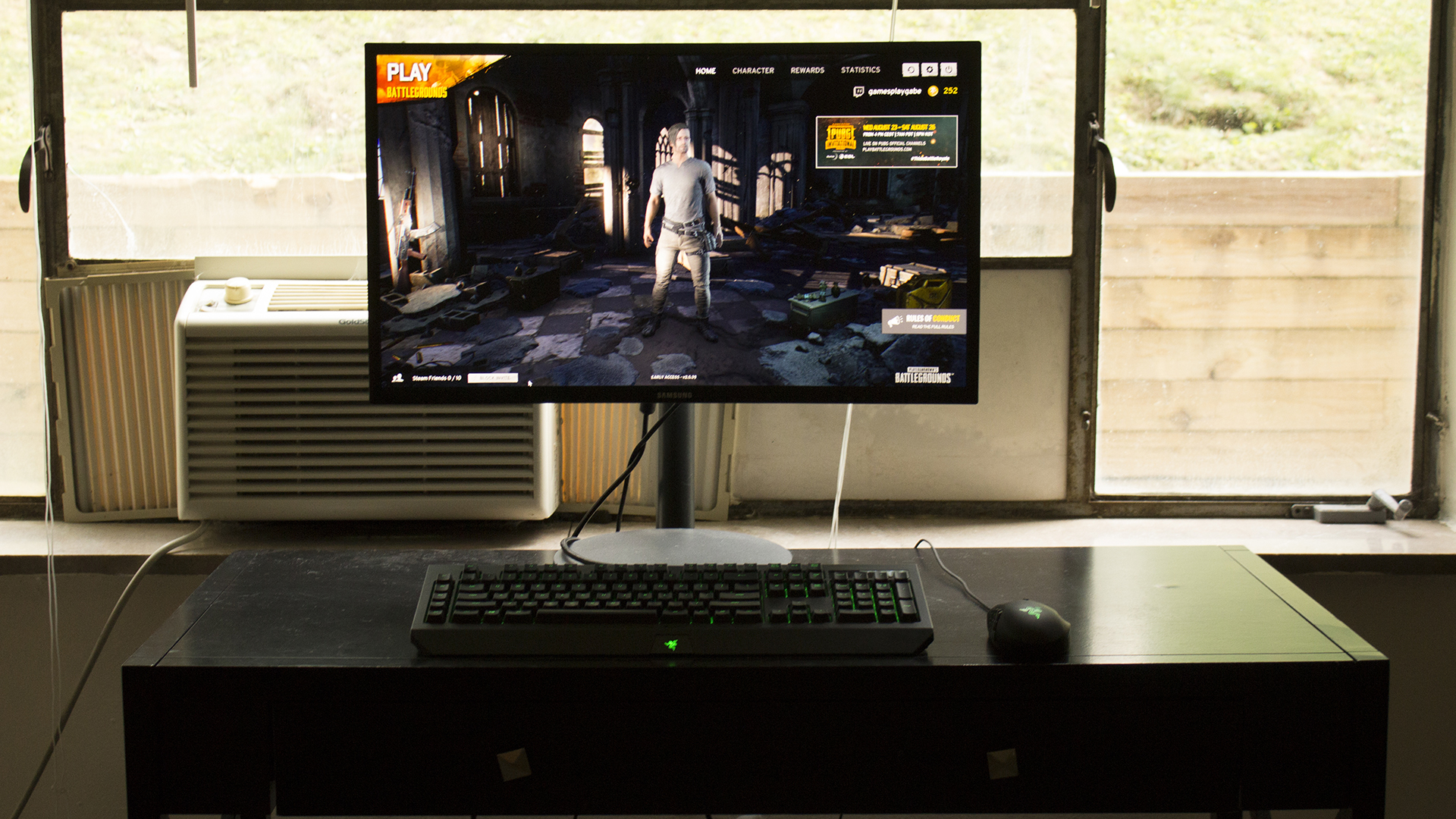
Here is the Samsung CFG70 Series 27-inch curved gaming monitor configuration sent to TechRadar for review:
Screen size: 27-inches (68.6cm)
Native resolution: 1,920 x 1,080
Pixel density: 81.59 ppi
Aspect ratio: 16:9
Refresh rate: 60-144Hz
Response time: 1ms
Viewing angle: 178-degrees horizontal/vertical
Brightness: 350cd/m2
Static contrast ratio: 3000:1
Ports: 2 x HDMI 1.4, 1 x DisplayPort 1.2, headphone jack
Built-in speakers: 2W x 2
Dimensions (including stand): 24.5 x 21.7 x 15.2 inches (62.2 x 55.1 x 38.6cm)
Weight (including stand): 13.7 pounds (6.2kg)
Price and availability
While the Samsung CFG70 is available in the United States for the high asking price of $369 USD and £369 GBP in the UK, it’s not available to purchase to readers of the land down under. Users on tighter budgets can pick up the more affordable 24-inch version of this monitor that features the same Full HD resolution, 144Hz refresh rate and other specs for $279 or £259.
Nevertheless, the Samsung CFG70 isn’t a bad deal for what you’re getting. Sure, the $249 (£279, AU$499) Acer GN276HL gaming monitor costs over $100 less for similar specs, but it’s a TN (Twisted Nematic) panel, whereas the CFG70 notably uses VA (Vertical Alignment) technology. Samsung’s option also has a dual-hinge arm while Acer’s bears little room for adjustment.
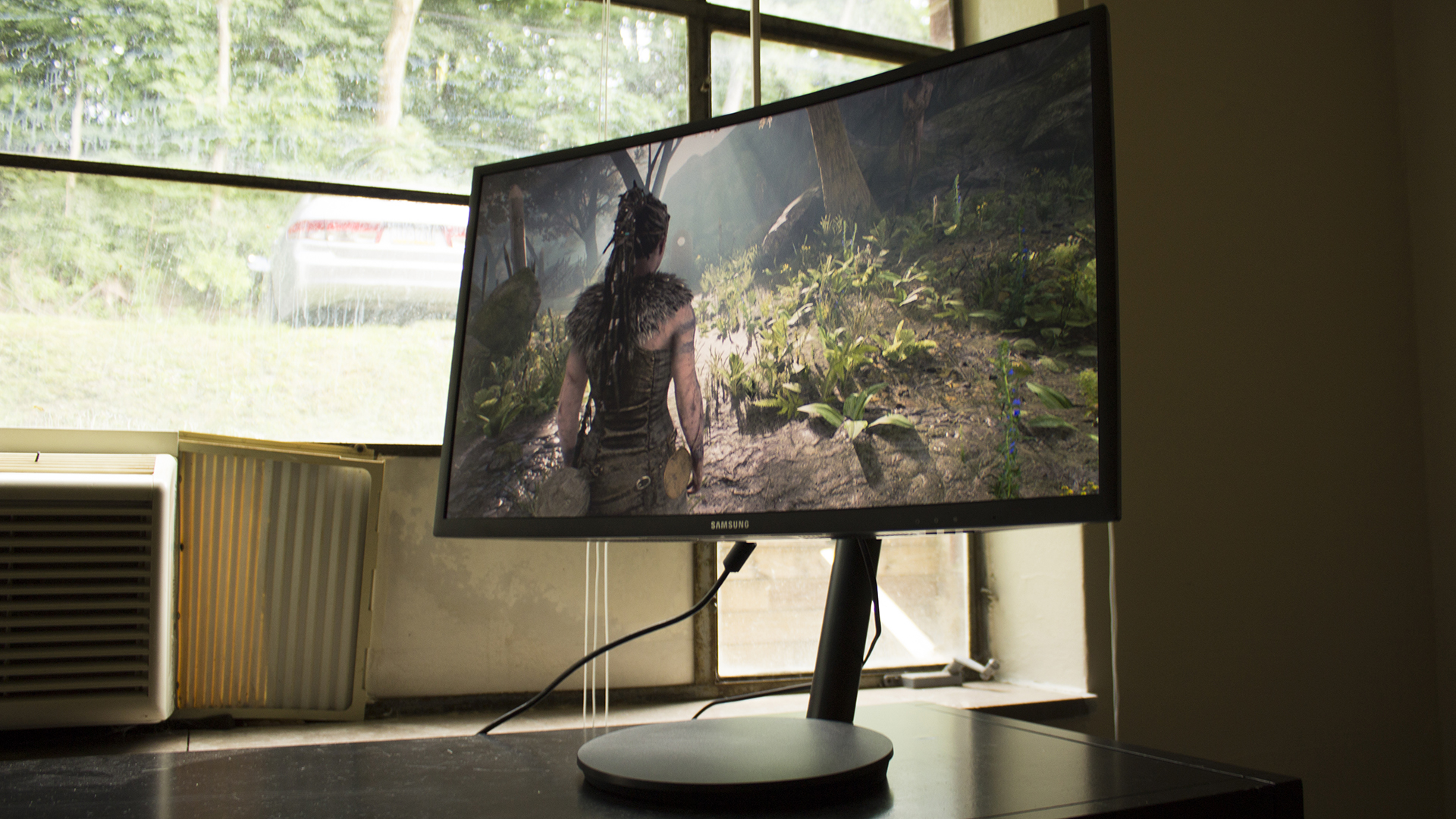
Design
The Samsung CFG70 has a distinct look that will draw your attention as soon as you walk into a room. I know this because on more than one occasion during my testing, a guest would ask about my monitor almost immediately upon coming through the door. This never happened with the Samsung U28E590D that I normally use.
For one, the 1800R curvature is hard to ignore. Though it would have been nice to get an ultra-wide resolution for this price. Still, the 16:9 aspect ratio and 144Hz refresh rate will push even the most extravagant builds to their limits at 1080p. That goes without mentioning Samsung’s inclusion of quantum dot technology, which makes 1,920 x 1,080 pixels a much easier pill to swallow.
What’s more, as mentioned previously, this monitor uses a VA panel as opposed to the Acer GN276HL’s TN display. This allows for better viewing angles and color reproduction, as well as a higher maximum brightness, than what Acer’s cheaper alternative is capable of. This proves true not only on paper, but in real-life practices too.
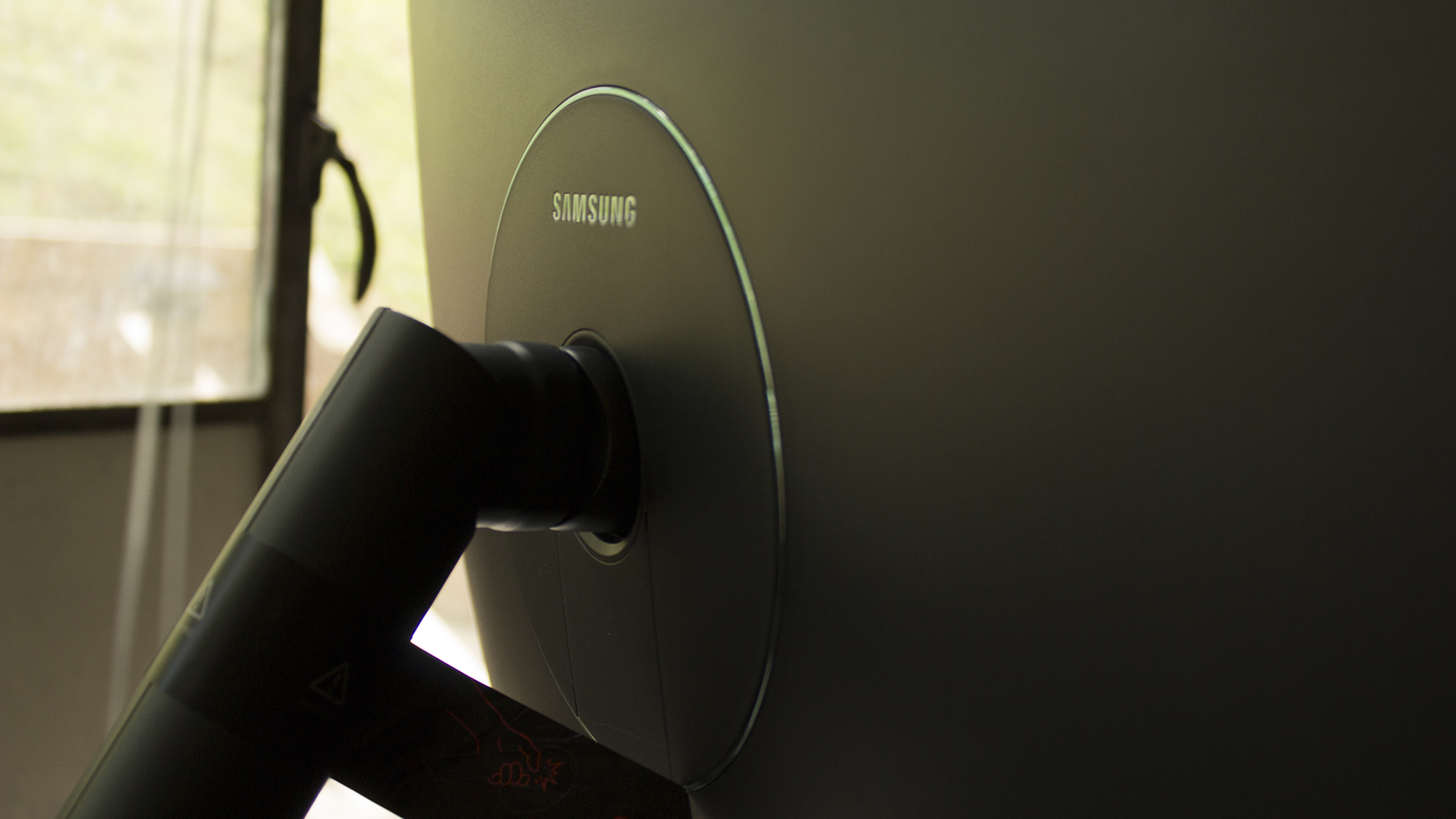
The Samsung CFG70 looks as tasty to spectators as it does to the users, making it that much more appealing to eSports athletes with live audiences. Our only major objection to the design is the base, which takes up significantly more space than most other monitor stands due to its dual-hinge joint.
In our testing, we had to remove the Razer BlackWidow Chroma V2’s accompanying wrist cushion for the monitor to fit on our desk. So if you’re going to shell out for this monitor, you’ll want to make sure you bring a bigger desk.
Else, you’ll be mounting the display to a wall or third party arm, which are options.As it comes with a VESA wall-mount kit, you’ll have everything you need to attach the Samsung CFG70 to your wall right out of the box, thereby avoiding the colossal base unit altogether.
Despite all the space the stand takes, its flexibility is handy. With the monitor mounted to the base, the screen easily raises and descends 140mm, rotates 90 degrees into portrait mode or even swivels 15 degrees left and right.
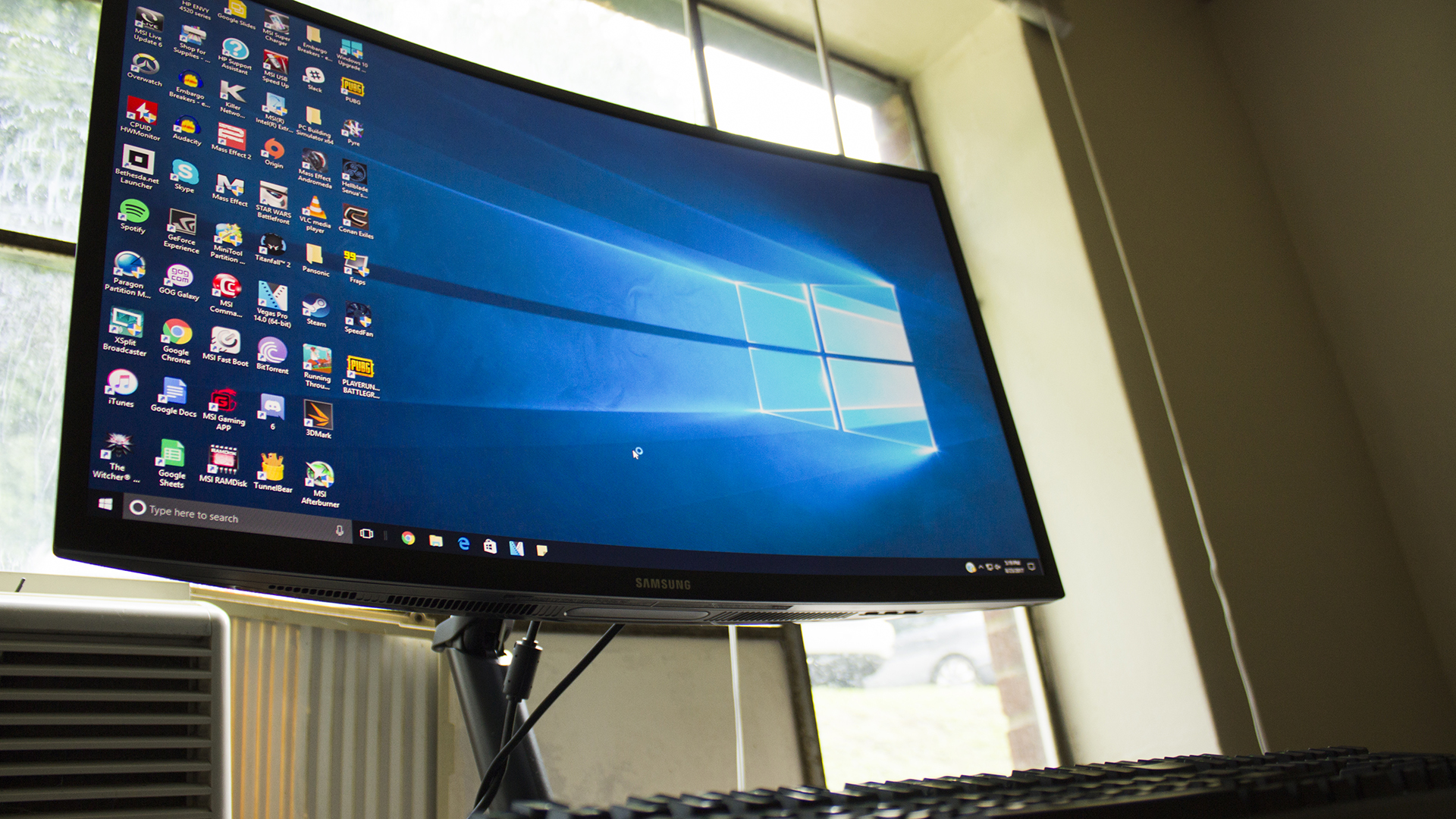
Performance
Featuring a up to a 1ms response time and, given the proper PC hardware, the aptitude to display frame rates up to 144 fps, the Samsung CFG70 is a monitor built to push limits.
Unfortunately, though, you can only fully harness the display’s power through a single DisplayPort 1.2 as its two HDMI 1.4 ports only support up to 120Hz. We also wished Samsung would have included a USB-C port to connect modern gaming laptops and the MacBooks of the world.
Tethered to a custom-built rig sporting an Nvidia GeForce GTX 1080 graphics card, a liquid-cooled Intel Core i7-6700K CPU and 32GB of DDR4 RAM, we managed to go above the standard 60 fps range but struggled to consistently meet the revered 144 fps in games like Overwatch, PlayerUnknown’s Battlegrounds and Hellblade: Senua’s Sacrifice.
Still, for PCs outfitted with beefier specs and fancier cooling systems, the Samsung CFG70 is buttery smooth. To make matters better, you can store up to three game profiles to the display, with one macro button located on the bottom dedicated to each. These can include custom picture modes you’ve configured yourself or one of seven predefined by Samsung.
That’s right, there are some pre-installed picture modes on the Samsung CFG70, some of which are based on game genres – like FPS, RTS and RPG – and others – like High-Brightness, Cinema and sRGB that are commonly found on non-gaming monitors. All of these options are navigated using a joystick-like control panel on the back, in classic Samsung fashion.
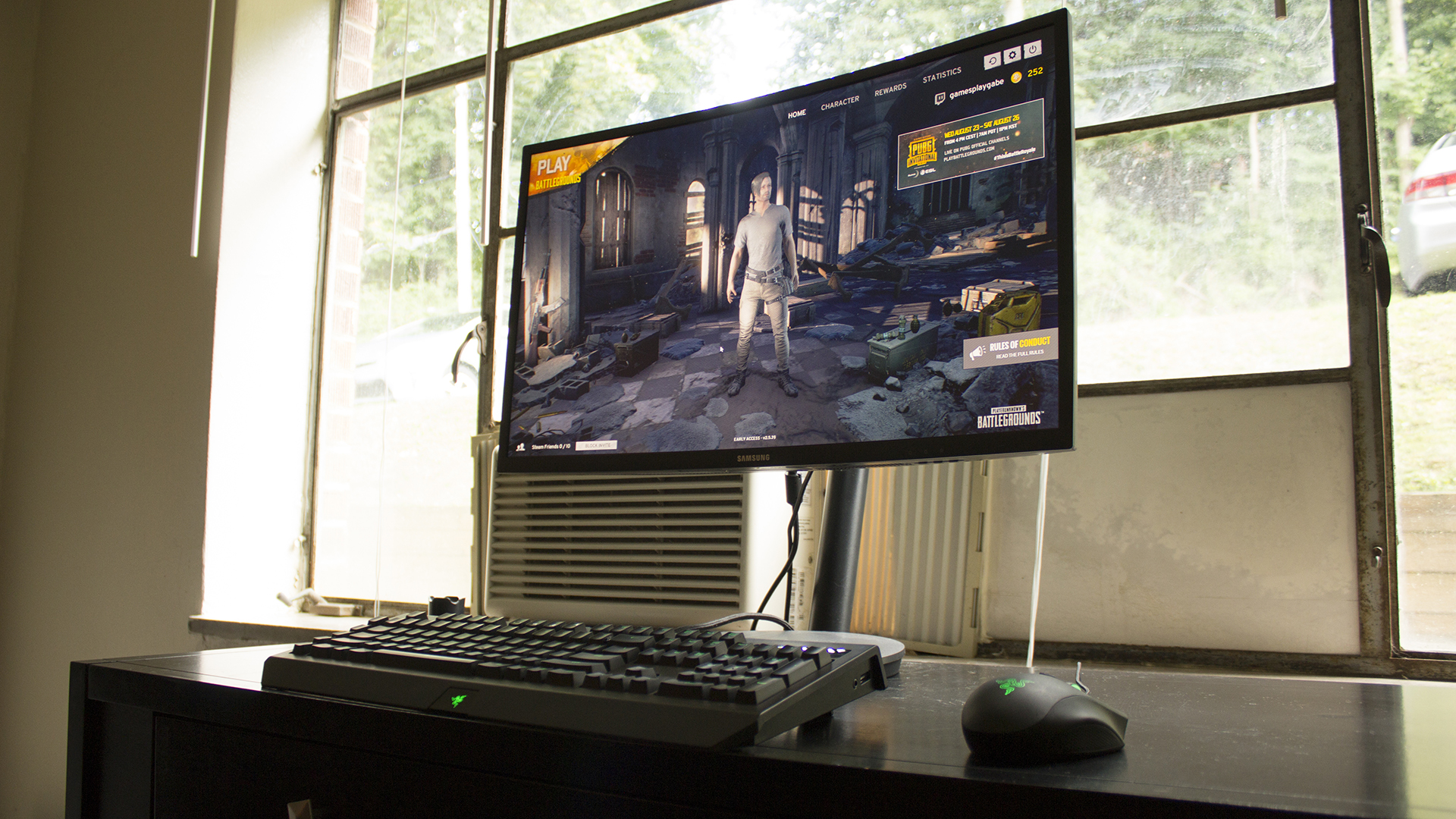
Verdict
Like the glory days of 16-bit Sonic the Hedgehog, the Samsung CFG70 is all about going fast. The refresh rates are high and the response times are low, giving competitive gamers everything they’ll need to dominate the field at Blizzcon. The visual quality of the screen is impeccable, and Samsung’s implementation of quantum dot tech and 1800R curvature are only enhanced by the flexible dual-hinge arm.
Although the specs are nice, as are all the bells and whistles, we can’t help but feel the Samsung CFG70 is expensive for a 1080p screen. 144Hz displays can be found cheaper elsewhere, though, with inferior TN panels. This curved, high-speed monitor’s price and 27-inch screen size also pushes it into the realm of higher resolution and ultra-wide monitors – not to mention the lack of USB-C, HDMI 2.0 and DisplayPort 1.3 connectivity.
For those willing to cough up $379 (£370) for a 144Hz curved VA panel, the Samsung CFG70 delivers on all of its promises and it’s one of the prettiest gaming monitors we’ve seen. Yet, for anyone else, there are much more affordable options out there that boast similar specs.
Overall, this makes the 27-inch Samsung CFG70 tough to recommend over many of its rivals despite our contention that it’s otherwise well-crafted. We will say that the Samsung CFG70 Series 24-inch Curved Gaming Monitor looks more attractive with its lower price.
